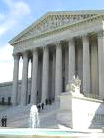|
|
|
Western States Agree to Cut Greenhouse Gases
Legal Business |
2007/02/26 21:04
|
| The governors of five western US states signed an agreement Monday to reduce emissions of greenhouse gases, a cause of global warming. During the winter meeting of the National Governors Association (NGA), the governors of Arizona, California, New Mexico, Oregon and Washington signed a memorandum of understanding to establish the Western Regional Climate Action Initiative, which calls for the states to set reduction goals within six months, devise a "market-based program" to reach those goals and track emissions through a regional registry. "In the absence of meaningful federal action, it is up to the states ... to address climate change," Gov. Janet Napolitano (D-AZ) said in a press release. The market-based program could take the form of a cap-and-trade system, in which companies whose emissions exceed mandatory limits could buy credits from companies that produce less pollution. A regional cap and trade program would be a powerful first step toward developing a national program, Gov. Arnold Schwarzenegger (R-CA), the only Republican among the five governors, said in an address to the NGA. Statements were also issued by Govs. Bill Richardson (D-NM), Ted Kulongoski (D-OR) and Christine Gregoire. Monday's agreement is only the latest joint effort by the western states. Last year, Arizona and New Mexico formed the Southwest Climate Change Initiative, and the governors of California, Oregon and Washington issued a joint statement in 2003 calling for regional action to address global warming. Elsewhere in the country, several Northeastern states have created the Regional Greenhouse Gas Initiative, to reduce carbon dioxide emissions from power plants through a regional cap-and-trade program, and some Midwestern states signed on to the Lake Michigan Air Directors Consortium, to establish a voluntary registry for companies to report their emissions-reduction efforts. Efforts to establish national emissions limits have gained traction in Congress since the Democrats became the majority party, with at least four major proposals emerging. President Bush opposes mandatory carbon dioxide (CO2) limits but has proposed reducing emissions through the use of alternative fuels. A coalition of businesses and environmental groups has called for federal legislation, including a cap-and-trade program, to limit emissions of CO2 and other greenhouse gases. In September, California became the first US state to restrict greenhouse gas emissions when Schwarzenegger signed a bill authorizing a state board to set emissions targets for various industries.
|
|
|
|
|
|
|
Supreme Court to review Wash state primary case
Breaking Legal News |
2007/02/26 21:02
|
| The Supreme Court said Monday it will consider the constitutionality of a statewide primary election system in which the top two finishers advance to the general election even if they are from the same party. The justices will hear arguments in the fall in a case from Washington state over its "Top 2" primary system that voters created. The system allows candidates to indicate their party affiliation on the ballot and is open to voters regardless of their party. The system is the successor to the blanket primary that the Supreme Court struck down in 2000 on the grounds that it violated political parties' rights. The Washington Democratic and Republican parties sued to block the new system, approved by voters in 2004. The parties said they would be forced to be associated with candidates they did not choose. Lower federal courts agreed with the parties. The new system, which has never been used, infringes on the rights of political parties to choose their own nominees, the 9th U.S. Circuit Court of Appeals said. "The net effect is the parties do not choose who associates with them and runs using their name; that choice is left to the candidates and forced upon the parties," Judge Raymond Fisher wrote.
|
|
|
|
|
|
|
Reed Smith LLP Adds Four Partners From Dechert
Law Firm News |
2007/02/26 21:02
|

Reed Smith LLP, one of the 15 largest law firms in the world, today announced the addition of four partners who handle high stakes state tax controversies for Fortune 500 companies and others across the U.S. Lee Zoeller, Kyle Sollie, David Kraus and Frank Gallo will join the firm’s Philadelphia office, effective today.
“The momentum we have recently achieved in our nationwide tax controversy practice with an outstanding group of attorneys in California gets another giant boost with the addition of this high-powered team on the East Coast,” said Gregory B. Jordan, firmwide Managing Partner of Reed Smith. “Landing Lee and his team in Philadelphia reflects our continued interest in strategically growing in our major markets.” The group has worked together for many years and built a substantial practice representing a diverse group of large companies in state tax controversy matters with a particular focus on the East coast. Mr. Zoeller joined Dechert in 1989. He was formerly chair of that firm’s state tax practice group. His practice is devoted to the litigation of state tax controversies before administrative appeals boards, tax tribunals, and state courts throughout the country. He is a 1989 graduate of The Dickinson School of Law and earned a B.A. from Indiana University of Pennsylvania in 1986. Mr. Sollie joined Dechert in 1996. His practice is devoted entirely to state tax litigation and appeals throughout the US, with a particular emphasis on the Mid-Atlantic and New England states. Mr. Sollie is a 1996 graduate of Villanova University School of Law and earned a B.A. from Temple University in 1993. Mr. Kraus joined Dechert in 1987. His practice is devoted to tax planning and compliance, as well as state tax appeals and litigation. Mr. Kraus is a 1985 graduate of Boston University School of Law and earned a B.A. from Dickinson College in 1982. Mr. Gallo joined Dechert in 1997. He focuses his practice on state tax planning and controversy matters, specializing in income/franchise and sales and use taxes. Mr. Gallo is a 1996 graduate of Villanova University School of Law and earned a B.S.A. from Villanova University in 1993. “Dechert is an outstanding firm and it has been a privilege to practice law with so many terrific people for 17 years, but in order to more effectively serve the state tax needs of our clients across the country, the case for moving to Reed Smith was compelling,” said Mr. Zoeller. “Joining forces with Reed Smith’s state tax lawyers in California who share a common focus on client relationships and service will create one of the premier state tax practices in the country.” Reed Smith launched its Tax Controversy Group with Jim Kleier, Brian Toman and John Messenger who joined from the San Francisco office of Preston Gates & Ellis in May 2005. The Group added its first Philadelphia-based member -- Phillip A. Pillar, former Mid-Atlantic Director of the Tax Controversy and Risk Management Services practice at Ernst & Young LLP -- in June 2005. The Tax Controversy Group has counseled and litigated on behalf of businesses, individuals, and governments with respect to franchise, income, sales, use, property, business and occupation, and other excise taxes. Reed Smith’s tax controversy practice has a broad range of capabilities focused on state tax issues associated with e commerce, telecommunications and other high technology issues, as well as regularly advising clients on strategies to minimize the impact of diverse and complex state taxes on business transactions in various industries. “Adding this group in Philadelphia gives Reed Smith critical mass on the East Coast in an important and growing practice area for the firm,” said Claudia Springer, managing partner of Reed Smith’s Philadelphia office. “We are simply thrilled to have Lee and his team joining us.”
About Reed Smith Reed Smith is one of the 15 largest law firms in the world, with more than 1,500 lawyers in 21 offices throughout the United States, Europe and the Middle East. Founded in 1877, the firm represents leading international businesses from Fortune 100 corporations to mid-market and emerging enterprises. Its attorneys provide litigation services in multi-jurisdictional matters and other high stake disputes, deliver regulatory counsel, and execute the full range of strategic domestic and cross-border transactions. Reed Smith is a preeminent advisor to industries including financial services, life sciences, health care, advertising and media, shipping, international trade and commodities, real estate, and education. For more information, visit reedsmith.com http://www.reedsmith.com |
|
|
|
|
|
|
Sony to Release Cheaper Blu-ray Disc Player
World Business News |
2007/02/26 20:59
|
Sony today revealed plans to release a cheaper Blu-ray player this summer. The high price of current Blu-ray players is often cited as a reason for consumers holding off on buying into high definition movies. Currently, Sony offers the BDP-S1 Blu-ray player for $999, a price aimed at the most hardcore of home theater enthusiasts. The company plans to release a new model, the BDP-S300, priced at $599 and says that the new player will offer all the functionality of the BDP-S1 plus the added ability to play CDs. The newer BDP-S300 will also be smaller and more compact than the BDP-S1, and is about the same size as a DVD player.
The BDP-S300 will bring standalone Blu-ray players in line with the market’s current cheapest way to watch Blu-ray movies—the PlayStation 3. Even at $599, the BDP-S300 won’t be the cheapest entry fee into the next-generation format. For $499, a consumer can buy Blu-ray functionality in the form of a 20GB PlayStation 3, which boasts nearly equal Blu-ray performance to standalone players. At half the price of Sony’s $999 standalone player, home theater fans may be finding the PS3’s video playing bang-for-buck irresistible. According to Sony VP Randy Waynick, “Eighty percent of people who buy a PS3 also buy Blu-ray movies to go with it,” which could help account for Blu-ray’s recent surge against HD DVD.
Even at PlayStation 3 or the upcoming BDP-S300 prices, consumers may still find the cost of high definition movies still too great. The situation is less severe, but similar on the side of HD DVD, where players can be found for $400, or even less if one has an Xbox 360. Sony has expressed difficulties in turning a profit in a market dominated by $50 DVD players, but continues to promise lower prices on Blu-ray hardware. Stan Glasgow, president of Sony said that by Christmas, prices for Blu-ray players should be down below $500. Exceptionally cheap Blu-ray players are still years away, but Glasgow expressed his believe that one day we may see a $50 Blu-ray player. “Over time, I think it will be just like DVD,” he said. |
|
|
|
|
|
|
Oil rises amid US chill, Iran tensions
International |
2007/02/26 17:01
|
Oil rose on Monday as a burst of cold weather boosted heating demand in the United States and as world powers discussed tightening UN sanctions on Iran, the world's fourth-largest oil exporter. US crude rose 26 cents to $US61.40 a barrel, just below the 2007 high of $US61.80 hit on Friday. London Brent was up 47 cents to $US61.35. Analysts said wintry weather sweeping across the key Midwest and North-east heating markets was supporting oil's gains, and added that prices could find even more strength heading into the spring, when gasoline demand picks up. "It is the first time this year that the large speculative funds are showing a net long position in crude oil," said Olivier Jakob, an analyst at Swiss-based Petromatrix. Oil prices have swung between a high of $US78.40 last July, when fighting flared in Lebanon, and a 20-month low of $US49.90 in January, when an expected influx of fund money failed to materialise, disappointing oil investors. A steady recovery in prices since late January has been supported by gradually tightening supplies - OPEC has twice cut output since November - and by concerns over a possible disruption of Iran's oil supplies. |
|
|
|
|
|
|
Supreme Court hears arguments in deadly force
Law Center |
2007/02/26 11:03
|
| The US Supreme Court heard oral arguments Monday in Scott v. Harris, 05-1631, where the court must decide whether a police officer violated a fleeing suspect's constitutional rights by using deadly force when he bumped his police car into the suspect's car to end a high speed chase. Victor Harris was pursued by Coweta County, Georgia police when he refused to pull over while speeding. Video taken from the dashboard of the police car showed the ensuing collision, which resulted in Harris' paralysis and eventual suit against former sheriff's deputy Timothy Smith for violation of the Fourth Amendment. The US Eleventh Circuit Court of Appeals held that Scott's qualified immunity claim under the Fourth Amendment was an insufficient defense because he acted unreasonably. The accident video was not played in court, but at least half of the bench appeared to have seen the footage; Justices Breyer and Kennedy each implied the video evidenced that contrary to the appeals court holding Harris was driving erratically. The Court is expected to rule by July. |
|
|
|
|
|
|
Painkillers linked to greater risk of heart attacks
Health Care |
2007/02/26 11:00
|
Regular use of painkillers such as aspirin, ibuprofen and paracetamol is linked to greater risk of stroke and heart attack from higher blood pressure, research published today shows. A wide-ranging US study has found that men who took paracetamol, aspirin or ibuprofen six or seven days a week over a two-year period were a third more likely to be diagnosed with high blood pressure than men who did not use them. Researchers, led by Dr John Forman of the Brigham and Women's hospital in Boston, studied 16,000 men whose records they checked over a four-year period. Those who took 15 or more pills per week were 48% more likely to have high blood pressure. The findings, published in the Archives of Internal Medicine, reiterate a 2002 study which found that commonly-used painkillers raise blood pressure in women.
More than five million Britons, including those suffering back pain, migraine or osteroarthritis take painkillers. The US research found that those who took paracetamol six or seven days a week were 34% more likely to be diagnosed with high blood pressure, and being overweight reduced this risk. Those who took aspirin as regularly were 26% more likely to have high blood pressure. For painkillers such as ibuprofen and naproxen, the risk increased by 38%. Being overweight increased this risk. Dr Elliott Antman, from the American Heart Association: said: "We advise physicians to start with nonpharmacologic treatments such as physical therapy and exercise, weight loss to reduce stress on joints, and heat or cold therapy," he said. Dr Gary Curhan, who also worked on the study, said men who were advised by a doctor to take an aspirin a day to reduce the risk of heart attack and stroke should continue to take them. "The benefit outweighs the risk," he said. |
|
|
|
|
|
|
Class action or a representative action is a form of lawsuit in which a large group of people collectively bring a claim to court and/or in which a class of defendants is being sued. This form of collective lawsuit originated in the United States and is still predominantly a U.S. phenomenon, at least the U.S. variant of it. In the United States federal courts, class actions are governed by Federal Rules of Civil Procedure Rule. Since 1938, many states have adopted rules similar to the FRCP. However, some states like California have civil procedure systems which deviate significantly from the federal rules; the California Codes provide for four separate types of class actions. As a result, there are two separate treatises devoted solely to the complex topic of California class actions. Some states, such as Virginia, do not provide for any class actions, while others, such as New York, limit the types of claims that may be brought as class actions. They can construct your law firm a brand new website and help you redesign your existing law firm site to secure your place in the internet. |
Law Firm Directory
|
|








